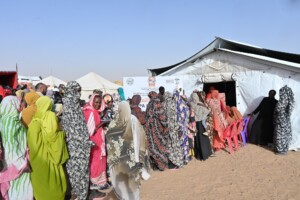Call for transparency in Sudan’s oil revenue spending
The former commissioner of Omdurman, Dr Mohamed Muhyeldin El Jimeiabi, has called on the Sudan government to open the file of oil revenues since 2000.
 Oil wells in Kordofan (File photo)
Oil wells in Kordofan (File photo)
The former commissioner of Omdurman, Dr Mohamed Muhyeldin El Jimeiabi, has called on the Sudan government to open the file of oil revenues since 2000.
He said in a press statement that the reports of the Auditor-General and the registry of the parliamentary sessions raise many questions about the spending of petroleum revenues and how.
He added: “The Sudanese people have a right to know how much the oil revenues are, where these funds have gone, how they have been managed.”
As previously reported by Radio Dabanga, Sudan’s President Omar Al Bashir said in his speech on the occasion of Eid El Adha that he will drastically review the macroeconomic fundamentals, leading to the adoption of detailed policies and measures to stimulate production, increase exports, and control imports.
However, Prof Hamid El Tijani, the head of public policy and administration at the American University in Cairo, scoffed at Al Bashir’s speech, describing it as “a talk for domestic consumption”.
Chronic fuel crisis
Sudan has suffered from a scarcity of fuel and cooking gas and flour crises last year, including in December. In March 2018 however, the crises extended and became acute.
Foreign currency
Traders in the foreign currency market have played down the government’s announcement of the start of the flow of the oil of South Sudan through Sudanese territory and its impact on the exchange rate of the Sudanese Pound (SDG) against the US Dollar in the parallel markets. They have described the allegation of the decrease of the price of the Dollar to SDG 38 as 'chit-chat'.
Businessmen and traders have complained of the return of the liquidity crisis in the banks and the restrictions on certain withdrawals.
A number of businessmen have confirmed that the banks have continued to place restrictions on withdrawals, making them reluctant to deposit their cash in the banks.
They pointed out that the liquidity crisis has continued in the branches of banks and the ATMs.











 and then
and then